ECU REMAP INTRODUCTION AND STAGES OF ECU REMAPPING
ECU stands for Engine Control Unit. It is an electronic control unit or computer that manages various aspects of an engine’s operation in a vehicle. The ECU controls and monitors the engine’s performance by receiving input from various sensors and making adjustments to parameters such as fuel injection, ignition timing, turbo boost pressure, and more.
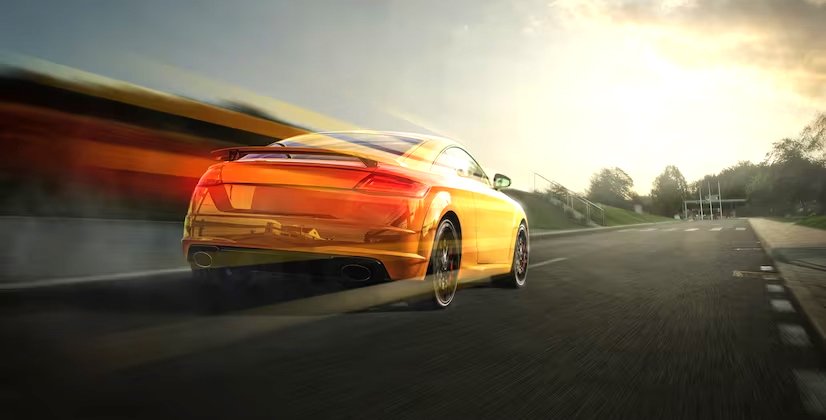
ECU remapping, also known as ECU tuning or chip tuning or a simple ECU remap, it is the process of modifying the software or firmware in the ECU to enhance the performance of the engine. This is done by reprogramming the ECU’s settings to optimize factors such as fuel efficiency, power output, torque, and throttle response. ECU remapping can also improve drivability and overall engine efficiency.
In cars, the ECU is a crucial component that helps manage the engine’s performance and ensure optimal operation. It plays a significant role in regulating fuel-air mixture, ignition timing, emissions control, and other important functions. By modifying the ECU through remapping, it is possible to unlock the full potential of the engine and achieve better performance characteristics tailored to specific requirements or preferences. Let us know more about ECU Remapping and it’s working, needs and ECU Remapping cost India.
Important Considerations Before Modifying Your Car:

- Understand the Complexity of the Engine: When it comes to modifying your car, it’s essential to recognize the intricate nature of the engine. Each component within the system must harmonize with others to achieve optimal performance. Only when all these components work seamlessly together can you truly reap the benefits of performance modifications. So, take the time to understand the complexity and interdependence of the engine’s various parts.
- Adopt a Step-by-Step Approach: Tuning your car should be approached incrementally and systematically. By taking a step-by-step approach, you can assess the improvements made by each modification and fine-tune them before moving on to the next one. This method allows you to carefully evaluate the impact of each change and make adjustments accordingly, ensuring that you achieve the desired results without causing any unforeseen issues.
- Choose a Mod-Friendly Car: Starting with a car known for being mod-friendly is a smart decision. Certain brands, such as Honda and Suzuki, have extensive aftermarket support in terms of available parts and tuner capabilities. They respond good to performance tuning done. On the other hand, attempting to enhance the speed of heavier vehicles like the Contessa or a Mahindra Jeep might yield limited results. Choose a car based on your objectives and consider its modifiability.
- Beware of Ineffective Modifications: Exercise caution when considering “go-fast” gimmicks like Turbo or electric superchargers, as they often prove to be a waste of money. It’s important to rely on common sense and assess the practicality of such modifications. For instance, equipping a front-wheel-drive car primarily driven below 120 kph with a DTM corner slammer would serve little purpose. Be discerning and prioritize modifications that genuinely enhance your car’s performance.
- Budget Considerations: Keep in mind that car tuning can be a costly endeavour. Before embarking on the modification process, establish a detailed budget. Modifications not only incur significant expenses but can also lead to reduced fuel efficiency, resulting in additional financial burdens. In some cases, highly modified cars or engines with increased compression ratios may require higher-octane fuel for optimal operation. Therefore, factor in the long-term financial implications of your modifications.
- Invest in Timing Equipment: Consider investing in a reputable timing device like the G-Tech series. These tools can accurately measure the benefits of your modifications, allowing you to quantify and assess the improvements made to your car’s performance. With precise data from a reliable timing device, you can determine the effectiveness of each modification and make informed decisions for future enhancements.
- Warranty Implications: Understand that modifying your car will likely void any existing warranty coverage. While modifications can enhance performance, it’s crucial to weigh the benefits against the potential loss of warranty protection. Be prepared for the possibility that you may need to rely on your own resources for repairs and maintenance after making modifications.
- Visual Enhancements: Exercise caution when altering the visual appeal of your car with body kits and spoilers. Poorly designed body kits can adversely affect your car’s aerodynamics, leading to instability at high speeds. Spoilers, for the most part, are purely aesthetic and only prove effective above speeds of 175kph. Consider the practical implications of visual modifications and prioritize functionality over appearance.
Note: It’s important to be aware that such modifications can void your warranty, especially if your car is within the coverage period.
Stage 1 Mods:
 Enhancing Your Car with Tyres and Alloy Wheels: Before delving into power upgrades and ECU remap for your vehicle, it is imperative to ensure that it possesses the appropriate grip levels to handle the current and future power delivery. It’s worth noting that alloy wheels are not always a necessity when considering upsizing your tyres. To delve deeper into this topic, we have provided a comprehensive guide titled “Choosing the Right Set of Tyres for Your Car.” The cost of this upgrade typically ranges from Rs.12,500 to Rs.50,000.
Enhancing Your Car with Tyres and Alloy Wheels: Before delving into power upgrades and ECU remap for your vehicle, it is imperative to ensure that it possesses the appropriate grip levels to handle the current and future power delivery. It’s worth noting that alloy wheels are not always a necessity when considering upsizing your tyres. To delve deeper into this topic, we have provided a comprehensive guide titled “Choosing the Right Set of Tyres for Your Car.” The cost of this upgrade typically ranges from Rs.12,500 to Rs.50,000.
Air Filters: If you opt for stock replacement performance filters, you won’t need to make any modifications, as they can be easily installed in place of your factory filter. However, it’s important to bear in mind that the performance gains from these filters are usually marginal. The approximate cost for a stock replacement filter ranges from Rs.2,000 to Rs.7,500.
 If you desire more substantial improvements, a Cold Air Intake (CAI) is a highly recommended option. Proper installation plays a crucial role in maximizing the benefits of a CAI, as it should draw in cold air instead of hot air. The colder the air available to the intake, the greater the performance gains. A genuine CAI draws air from the outside, while short rams and most CAI applications take air from under the hood. Interestingly, even if the outside temperature reaches 35 degrees Celsius, the air is still significantly cooler than the air under your hood. Alternatively, you can consider using a high-quality conical or universal filter without a CAI. Experts often suggest mandrel bent aluminum pipes with minimal restrictions for the plumbing. It is essential to ensure that the pipe’s diameter remains uniform and larger than that of the throttle body throughout its entire length. However, it is important to bear in mind that a CAI may increase the sound levels, and precautions should be taken when driving in rainy conditions. In dusty environments, K&N recommends using a shroud. The approximate cost for a CAI ranges from Rs.5,000 to Rs.17,500.
If you desire more substantial improvements, a Cold Air Intake (CAI) is a highly recommended option. Proper installation plays a crucial role in maximizing the benefits of a CAI, as it should draw in cold air instead of hot air. The colder the air available to the intake, the greater the performance gains. A genuine CAI draws air from the outside, while short rams and most CAI applications take air from under the hood. Interestingly, even if the outside temperature reaches 35 degrees Celsius, the air is still significantly cooler than the air under your hood. Alternatively, you can consider using a high-quality conical or universal filter without a CAI. Experts often suggest mandrel bent aluminum pipes with minimal restrictions for the plumbing. It is essential to ensure that the pipe’s diameter remains uniform and larger than that of the throttle body throughout its entire length. However, it is important to bear in mind that a CAI may increase the sound levels, and precautions should be taken when driving in rainy conditions. In dusty environments, K&N recommends using a shroud. The approximate cost for a CAI ranges from Rs.5,000 to Rs.17,500.
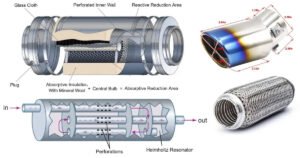 Free-Flow Exhaust: A well-designed free-flow exhaust system can significantly enhance your engine’s breathing capabilities and result in notable performance and fuel efficiency gains. When considering an exhaust upgrade, it is crucial to opt for a complete free-flow kit, which includes headers, rather than solely a muffler or end-can kit. The design of the header plays a critical role, and you can specify your preference for low, mid, or high-rpm gains to the installer. Since the majority of driving time is spent at low to mid-range rpms, focusing on power gains within this range may be more beneficial. It is important to maintain appropriate back pressure to avoid sacrificing torque. Additionally, remember that an exhaust system is only as strong as its weakest link, often being the cat-con or mid-muffler. Some tuners may remove the cat-con, but this can lead to difficulties in meeting emission norms. To ensure additional safety, it is advisable to insulate the exposed part of the exhaust system within the hood using asbestos wire (an affordable option) or ceramic coating (a more expensive choice). The approximate cost for a free-flow exhaust ranges from Rs.7,500 to Rs.25,000.
Free-Flow Exhaust: A well-designed free-flow exhaust system can significantly enhance your engine’s breathing capabilities and result in notable performance and fuel efficiency gains. When considering an exhaust upgrade, it is crucial to opt for a complete free-flow kit, which includes headers, rather than solely a muffler or end-can kit. The design of the header plays a critical role, and you can specify your preference for low, mid, or high-rpm gains to the installer. Since the majority of driving time is spent at low to mid-range rpms, focusing on power gains within this range may be more beneficial. It is important to maintain appropriate back pressure to avoid sacrificing torque. Additionally, remember that an exhaust system is only as strong as its weakest link, often being the cat-con or mid-muffler. Some tuners may remove the cat-con, but this can lead to difficulties in meeting emission norms. To ensure additional safety, it is advisable to insulate the exposed part of the exhaust system within the hood using asbestos wire (an affordable option) or ceramic coating (a more expensive choice). The approximate cost for a free-flow exhaust ranges from Rs.7,500 to Rs.25,000.
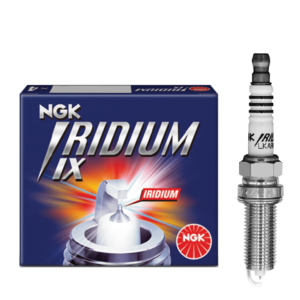 Spark Plugs: For a stock or marginally modified car, the installation of performance plugs is generally unnecessary. The benefits of iridium plugs are minimal and hardly noticeable. However, if you do decide to install them, make sure to select plugs with the correct heat range for your engine. The approximate cost for spark plugs ranges from Rs.800 to Rs.3,500.
Spark Plugs: For a stock or marginally modified car, the installation of performance plugs is generally unnecessary. The benefits of iridium plugs are minimal and hardly noticeable. However, if you do decide to install them, make sure to select plugs with the correct heat range for your engine. The approximate cost for spark plugs ranges from Rs.800 to Rs.3,500.
Plug Wires: Similar to spark plugs, aftermarket plug wires do not significantly enhance performance for stock or marginally modified engines. The benefits of upgrading plug wires usually become noticeable when your modifications necessitate a custom engine management system or a high-performance ignition system. At this stage, it is not recommended to invest in plug wires, as it would be a waste of money. The approximate cost for plug wires ranges from Rs.1,500 to Rs.6,000.
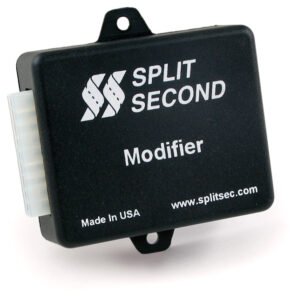
Temperature Signal Modifiers: These devices are relatively simple to install but may not result in significant performance gains, if any. They work by modifying certain signals delivered to the Engine Control Unit (ECU), leading to altered fuel and ignition maps. The approximate cost for temperature signal modifiers ranges from Rs.900 to Rs.9,000.
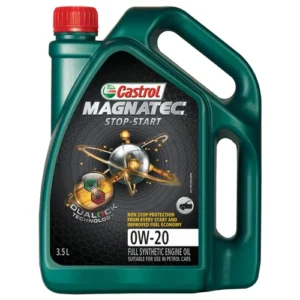 Synthetic Oil: Synthetic lubricants are highly recommended by Team-BHP due to their superior protection and enhanced lubrication properties. If you want a detailed explanation of the differences between synthetic oil and mineral oil, we have a thread titled “Synthetic Oil vs. Mineral Oil” that you can refer to. The approximate cost for synthetic oil ranges from Rs.500 to Rs.1300 per liter. For a mere 4 litre it can cost around Rs. 3500 to 4000.
Synthetic Oil: Synthetic lubricants are highly recommended by Team-BHP due to their superior protection and enhanced lubrication properties. If you want a detailed explanation of the differences between synthetic oil and mineral oil, we have a thread titled “Synthetic Oil vs. Mineral Oil” that you can refer to. The approximate cost for synthetic oil ranges from Rs.500 to Rs.1300 per liter. For a mere 4 litre it can cost around Rs. 3500 to 4000.
Strut Braces: Strut braces, also known as tower bars, effectively reduce flex and contribute to increased grip levels and stability during cornering. However, their impact is primarily noticeable during aggressive cornering maneuvers. The approximate cost for strut braces ranges from Rs.1,500 to Rs.5,500.
Short-Shifters: Short-shifters are designed to shorten the throw of your gear lever, resulting in quicker gear shifts. It is important to note that there is an optimum length for the shifter based on throw, ergonomics, and personal preferences, and it may require some adaptation. Most drivers find that the stock shifter meets their needs adequately. The approximate cost for short-shifters ranges from Rs.4,500 to Rs.7,500.
Stage 2 Mods:
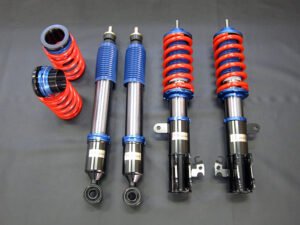 Performance Suspension Kits: In order to complement the increased power output of your engine, it is crucial to enhance the grip levels of your car. There are numerous reputable options available for performance suspension kits, including struts, coils, coil-over springs, dampers (shock absorbers), and camber kits (polyurethane bush kits). These upgrades will significantly improve the handling capabilities of your vehicle. The approximate cost for performance suspension kits ranges from Rs.10,000 to Rs.1,00,000.
Performance Suspension Kits: In order to complement the increased power output of your engine, it is crucial to enhance the grip levels of your car. There are numerous reputable options available for performance suspension kits, including struts, coils, coil-over springs, dampers (shock absorbers), and camber kits (polyurethane bush kits). These upgrades will significantly improve the handling capabilities of your vehicle. The approximate cost for performance suspension kits ranges from Rs.10,000 to Rs.1,00,000.
 Head Porting & Polishing: Cylinder head porting and polishing involve enlarging and smoothing the intake and exhaust ports, resulting in improved gas flow rates in terms of quality and quantity. A high-quality porting and polishing job can deliver noticeable power gains. It’s important to note that the intake ports should have a rough finish, while the exhaust ports should have a mirror-like finish. The approximate cost for head porting and polishing ranges from Rs.9,000 to Rs.15,000.
Head Porting & Polishing: Cylinder head porting and polishing involve enlarging and smoothing the intake and exhaust ports, resulting in improved gas flow rates in terms of quality and quantity. A high-quality porting and polishing job can deliver noticeable power gains. It’s important to note that the intake ports should have a rough finish, while the exhaust ports should have a mirror-like finish. The approximate cost for head porting and polishing ranges from Rs.9,000 to Rs.15,000.
 Removing the Rev Limiter: This relatively simple modification can be performed by an ECU specialist in a short amount of time. By raising the manufacturer-set RPM limits, you can potentially improve lap times by holding a gear longer and enhance acceleration by reducing the number of upshifts during 0-100 km/h sprints. However, it is crucial to ensure that your engine internals can handle the additional stress. It’s worth noting that removing the rev limiter may not result in a power increase for all engines. The approximate cost for removing the rev limiter starts from Rs.3,500.
Removing the Rev Limiter: This relatively simple modification can be performed by an ECU specialist in a short amount of time. By raising the manufacturer-set RPM limits, you can potentially improve lap times by holding a gear longer and enhance acceleration by reducing the number of upshifts during 0-100 km/h sprints. However, it is crucial to ensure that your engine internals can handle the additional stress. It’s worth noting that removing the rev limiter may not result in a power increase for all engines. The approximate cost for removing the rev limiter starts from Rs.3,500.
 Nitrous Oxide Systems: Popularly known as NOS, nitrous oxide systems are affordable power boosters favored by drag racers. However, due to the inherent risks associated with their installation, caution must be exercised. It is essential not to exceed the recommended dosage to prevent engine damage. Adjusting the timing by a few degrees is also necessary. For guidance on setting up your car with nitrous, refer to a comprehensive guide. The approximate cost for nitrous oxide systems ranges from Rs.22,000 to Rs.75,000.
Nitrous Oxide Systems: Popularly known as NOS, nitrous oxide systems are affordable power boosters favored by drag racers. However, due to the inherent risks associated with their installation, caution must be exercised. It is essential not to exceed the recommended dosage to prevent engine damage. Adjusting the timing by a few degrees is also necessary. For guidance on setting up your car with nitrous, refer to a comprehensive guide. The approximate cost for nitrous oxide systems ranges from Rs.22,000 to Rs.75,000.
 Performance Camshafts: Performance camshafts are excellent modifications that can provide power gains ranging from 10% to 20%. They are available in options for low, mid, and high-rpm gains. It is highly recommended to increase the compression ratio when installing performance camshafts. Additionally, using a cam adjuster (variable cam pulley) will allow you to fully optimize the benefits of the camshafts. It’s important to avoid extreme cam profiles unless head work is performed. High-lift cams can be expensive and are not ideal for daily-driven cars as they may compromise low-end response and fuel efficiency. Furthermore, tuning idle settings may be necessary. The approximate cost for performance camshafts ranges from Rs.12,000 to Rs.35,000.
Performance Camshafts: Performance camshafts are excellent modifications that can provide power gains ranging from 10% to 20%. They are available in options for low, mid, and high-rpm gains. It is highly recommended to increase the compression ratio when installing performance camshafts. Additionally, using a cam adjuster (variable cam pulley) will allow you to fully optimize the benefits of the camshafts. It’s important to avoid extreme cam profiles unless head work is performed. High-lift cams can be expensive and are not ideal for daily-driven cars as they may compromise low-end response and fuel efficiency. Furthermore, tuning idle settings may be necessary. The approximate cost for performance camshafts ranges from Rs.12,000 to Rs.35,000.
Map Sensor Signal Modifiers: Map sensor signal modifiers can slightly enhance part-throttle performance, resulting in marginal performance gains. The approximate cost for map sensor signal modifiers ranges from Rs.12,000 to Rs.25,000.
Valve Angling: A multi-angle valve job can significantly improve head flow, leading to noticeable performance gains during regular street driving. However, it is essential to understand that this task requires high precision. The approximate cost for valve angling starts from Rs.3,500.
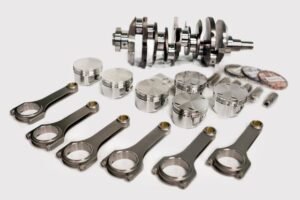 Over-Boring / Stroker Kits: Over-boring involves increasing the cubic capacity (CC) of the engine by altering the piston size and stroke. This modification requires replacing pistons, connecting rods, and the crankshaft. In simple terms, a larger engine size translates to more power. For example, a 1.3-liter engine can be over-bored to a 1.5-liter engine. The approximate cost for over-boring/stroker kits varies depending on the specific components and engine type. It is advisable to consult with an experienced engine builder or tuner to determine the cost for your specific requirements.
Over-Boring / Stroker Kits: Over-boring involves increasing the cubic capacity (CC) of the engine by altering the piston size and stroke. This modification requires replacing pistons, connecting rods, and the crankshaft. In simple terms, a larger engine size translates to more power. For example, a 1.3-liter engine can be over-bored to a 1.5-liter engine. The approximate cost for over-boring/stroker kits varies depending on the specific components and engine type. It is advisable to consult with an experienced engine builder or tuner to determine the cost for your specific requirements.
Please note that the mentioned costs are approximate and can vary based on factors such as the brand of the components, labor charges, and local market conditions.
Stage 3 Mods:
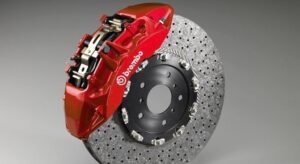 Performance Brake Systems: As you progress to stage three modifications for ECU Remapping, it’s important to upgrade your braking system to handle the increased power of your vehicle. Upgraded boosters, performance discs, and street/performance brake pads are available options to improve your car’s stopping power. As ECU Remaps and other upgrades deliver more power to your wheel, then it becomes necessary to invest in stopping power too. The cost for performance brake systems can range from Rs.3,000 to Rs.40,000. Brembo is the biggest name that comes for performance upgrade.
Performance Brake Systems: As you progress to stage three modifications for ECU Remapping, it’s important to upgrade your braking system to handle the increased power of your vehicle. Upgraded boosters, performance discs, and street/performance brake pads are available options to improve your car’s stopping power. As ECU Remaps and other upgrades deliver more power to your wheel, then it becomes necessary to invest in stopping power too. The cost for performance brake systems can range from Rs.3,000 to Rs.40,000. Brembo is the biggest name that comes for performance upgrade.
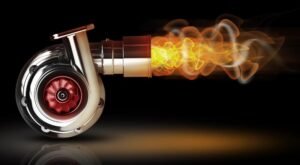 Turbochargers: Turbochargers offer significant power gains, but it’s important not to exceed 6-8 psi on a stock engine. If you wish to go higher, be prepared for a substantial investment in forged internals, sleeves, and other engine components. The approximate cost for turbochargers starts from Rs.1,25,000.
Turbochargers: Turbochargers offer significant power gains, but it’s important not to exceed 6-8 psi on a stock engine. If you wish to go higher, be prepared for a substantial investment in forged internals, sleeves, and other engine components. The approximate cost for turbochargers starts from Rs.1,25,000.
Superchargers: Superchargers, also known as “blowers,” are another form of forced induction. They are more expensive to install compared to turbos and are driven by the engine’s crankshaft, unlike turbos that utilize exhaust gas energy. While supercharger kits are available for some engines, Indian tuners generally prefer turbocharging. The approximate cost for superchargers starts from Rs.1,25,000.
Engine Swaps: If you’ve reached the limits of your current engine’s power or simply desire a larger powerplant, engine swaps can be a viable option. Many tuner-friendly cars have a range of engine options available for swapping. When considering an engine swap, it’s important to consult with tuners who have the necessary experience, knowledge, and infrastructure. Some swaps may require significant modifications for a successful installation. The approximate cost for engine swaps starts from Rs.30,000.
Upgrade Clutch: In stage three modifications, a performance clutch may become necessary to effectively transfer the increased power to the wheels. There are various options available, including street, drag, and race applications. It’s important to consider your car’s usage as some performance clutches may be less suitable for bumper-to-bumper traffic. The approximate cost for an upgraded clutch ranges from Rs.10,000 to Rs.50,000.
 Lighter Flywheel: Installing a lighter flywheel can improve throttle response at all RPMs by reducing inertia. It works well when paired with a balanced crankshaft. However, it’s not recommended for a stock engine as it may result in torque loss at low RPMs. Lightened flywheels are popular in racing applications and work well with short (close-ratio) gearboxes. The approximate cost for a lighter flywheel ranges from Rs.15,000 to Rs.25,000.
Lighter Flywheel: Installing a lighter flywheel can improve throttle response at all RPMs by reducing inertia. It works well when paired with a balanced crankshaft. However, it’s not recommended for a stock engine as it may result in torque loss at low RPMs. Lightened flywheels are popular in racing applications and work well with short (close-ratio) gearboxes. The approximate cost for a lighter flywheel ranges from Rs.15,000 to Rs.25,000.
Gearing: The gearbox plays a crucial role in optimizing power delivery from the engine at different RPM ranges. You may choose to alter the final drive or even opt for a custom gearbox. In addition, the transmission may require stronger drive shafts to handle the increased power. The cost for gearing modifications can start from Rs.6,500.
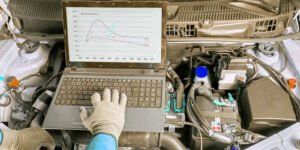 ECU Replacement: The ECU (engine control unit) is responsible for controlling various engine parameters and functions. Custom ECUs can be tuned by ecu remapping tools and software that are made specifically for your engine, resulting in power gains ranging from 5% for stock engines to over 30% for heavily modified engines. Stand-alone engine management systems like Link, AEM, and TEC-II offer great flexibility but also come with complexity, custom fitting requirements, and higher cost. As you progress through stage three modifications, replacing the ECU may become necessary for a proper ECU Remap. The approximate cost for an ECU replacement/starts from Rs.25,000.
ECU Replacement: The ECU (engine control unit) is responsible for controlling various engine parameters and functions. Custom ECUs can be tuned by ecu remapping tools and software that are made specifically for your engine, resulting in power gains ranging from 5% for stock engines to over 30% for heavily modified engines. Stand-alone engine management systems like Link, AEM, and TEC-II offer great flexibility but also come with complexity, custom fitting requirements, and higher cost. As you progress through stage three modifications, replacing the ECU may become necessary for a proper ECU Remap. The approximate cost for an ECU replacement/starts from Rs.25,000.
Conclusion:
It’s important to note that the costs mentioned are approximate and can vary depending on various factors such as the specific car model, the brand of the aftermarket parts, labor charges, and local market conditions. Additionally, it’s crucial to consult with experienced tuners or professionals who have expertise in performing these modifications to ensure the best results and avoid any potential issues. ECU Remapping is for Petrol ECU Remap, Diesel ECU Remap, EV Remap is not tested as of now, nor many results of successful ECU remapping in EV segment is there. There are ECU Remapping software free download available, but i would suggest not to use them, instead go for the trained professionals.
Remember to prioritize safety and reliability when considering performance modifications. Upgrading power without taking into account other aspects of the vehicle, such as brakes, suspension, and drivetrain, can lead to imbalances and compromised handling. It’s recommended to approach the modification process holistically and seek expert advice to achieve a well-rounded and optimized performance upgrade for your vehicle.
Best ECU remapping services in India are: Wolf Moto, Quantum Tuning, Autopsyche, TuneOTronics, ICD TUNING Chennai, Red Rooster
FAQ (Frequently Asked Questions) section for ECU remapping:
Q1: What is ECU remapping? A1: ECU remapping, also known as engine tuning or chip tuning, is the process of modifying the electronic control unit (ECU) of a vehicle to improve its performance, power, and efficiency.
Q2: Why should I consider ECU remapping? A2: ECU remapping can provide several benefits, including increased horsepower and torque, improved fuel efficiency, enhanced throttle response, and optimized engine performance.
Q3: Is ECU remapping safe for my vehicle? A3: When performed by a reputable and experienced professional, ECU remapping is generally safe. However, it’s important to choose a reliable provider who uses quality tools and software to ensure the process is carried out correctly.
Q4: Will ECU remapping void my vehicle warranty? A4: ECU remapping can potentially void your vehicle warranty, as it involves making modifications to the original settings. It’s advisable to check with your vehicle manufacturer or warranty provider to understand their specific policies.
Q5: Can ECU remapping improve fuel efficiency? A5: Yes, ECU remapping can optimize the fuel-to-air ratio, ignition timing, and other engine parameters, resulting in improved fuel efficiency. However, the exact fuel economy improvement will vary depending on driving habits and other factors.
Q6: How long does the ECU remapping process take? A6: The duration of ECU remapping can vary depending on the vehicle and the complexity of the modifications. In general, it can take a few hours to complete.
Q7: Is ECU remapping reversible? A7: Yes, ECU remapping can be reversed by reinstalling the original ECU software. However, it’s important to keep in mind that any warranty implications or modifications made to the vehicle during the remapping process may still be a consideration.
Q8: Will ECU remapping affect my vehicle’s emissions? A8: ECU remapping can potentially affect emissions, as it involves modifying the engine parameters. It’s essential to ensure that any modifications comply with local emission regulations.
Q9: Is ECU remapping legal? A9: ECU remapping is legal in many countries. However, it’s crucial to comply with local regulations and emission standards. It’s advisable to consult with a professional or local authorities to ensure compliance.
Q10: Can ECU remapping be done on any vehicle? A10: ECU remapping is possible for most modern vehicles with an electronic control unit. However, the compatibility may vary depending on the make, model, and year of the vehicle. It’s best to consult with a professional to determine if your vehicle is suitable for remapping.
Remember, these answers are general and may vary based on specific circumstances. It’s always recommended to consult with a professional ECU remapping service provider for personalized advice related to your vehicle.
You may also like to read. Click Here






